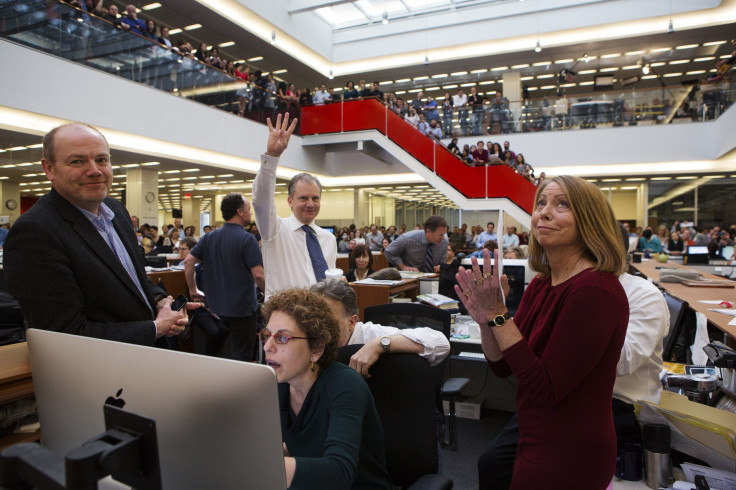Jill Abramson Exit Was Not Her Decision; Cause Remains A Mystery

Jill Abramson’s sudden departure as top editor Wednesday surprised the newsroom of The New York Times, and insiders there remain baffled as to what prompted her abrupt exit. It's clear, though, that Abramson didn't choose to step down. The paper's own report on the management change opened by saying, "Jill Abramson has been dismissed as executive editor of The New York Times."
Sources used execution imagery to describe Abramson’s ouster, suggesting that there may have been a dramatic incident that prompted it. Speculation is settling on a conflict between her and Times publisher Arthur Sulzberger Jr., or CEO Mark Thompson, or both. She will be replaced by her managing editor, Dean Baquet.
Sulzberger said in a statement to the Times staff that a “management issue” was behind Abramson’s departure, and told senior editors that the decision had nothing to do with the Times' journalism, the editorial direction of the paper or the relationship between business and editorial -- appearing to exclude a disagreement over native advertising as the cause of her apparent firing.
Ken Auletta, in a New Yorker blog, reported that Abramson recently discovered that her pay and pension benefits were significantly lower than those of her predecessor, Bill Keller -- a claim the Times has denied -- and that she "confronted the top brass" about the discrepancy. Another issue that led to the firing, according to Auletta, was Abramson's plan to hire a deputy managing editor for the digital side of the Times. Baquet reportedly told Sulzberger that he had not been consulted.
Abramson’s brief tenure -- less than three years -- recalls that of Howell Raines, a widely disliked executive editor who in 2003 was pushed out two years into his tenure. While Abramson has been credited with maintaining high-quality journalism during her time as editor, the now-infamous young reporter Jayson Blair fabricated numerous stories that were published in the Times on Raines’ watch. Still, Raines was present at the announcement of his resignation and addressed the newsroom, thanking his colleagues for “the honor and privilege of being a member of the best journalistic community in the world.”
Abramson left with no such ceremony; according to all available information, she did not say goodbye to her staffers in person. It is unclear if that was Abramson’s decision or if she was denied the opportunity. The New York Times did not immediately respond to requests for further information.
Abramson issued a brief statement, saying, “I’ve loved my run at The Times. … I got to work with the best journalists in the world doing so much stand-up journalism.”
Abramson was the first female to serve as the top editor of the Times and Baquet, 57, is the paper's first African-American executive editor. Abramson has had a reputation for being difficult to get along with, and tensions between her and Baquet came to a head in April 2013, when the normally low-key Baquet punched a wall and stormed out of the newsroom after an argument. Baquet later told Politico that he regretted having what he described as a “tantrum.”
“He is an exceptional reporter and editor with impeccable news judgment who enjoys the confidence and support of his colleagues around the world and across the organization,” Sulzberger said in a statement.
© Copyright IBTimes 2025. All rights reserved.






















